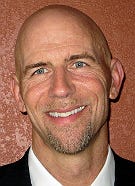Schlagbaum, a Channel Partners/Channel Futures Influencer honoree, has quite the legacy in the channel. And it's far from over.

When Craig Schlagbaum began his career circa 1990, he envisioned being in sales, but more on the creative side.
He never even considered a career in technology, much less working for a communications company. But flash-forward to 2018 and he’s Comcast Business‘ vice president of indirect channels — with a long history of building successful channel programs from the ground up.
He’s also one of our eight Channel Influencers and a founding member of the Channel Futures Think Tank. He has been instrumental in driving rapid growth and positioning Comcast Business as a serious player in cloud services. The job is especially difficult because Comcast Business has fierce competitors and an aggressive direct sales arm.

Cary Tengler
Cary Tengler
Cary Tengler reports directly to Schlagbaum and is responsible for Comcast Business’ national sales partners, including master agents and “e-tailers.” He also manages its technology alliance partners.
“Craig has an unmatched record when it comes to building channel programs,” he said. “Before the CenturyLink/Level 3 merger, he could lay claim to having created three of the top five telecom channel programs. He is an innovative and calculating risk-taker who constantly challenges me and the rest of the team to get the most from our partners. Craig has built an amazing team at Comcast Business and we pride ourselves on being the best and running our business the right way.”
Starting Out
Schlagbaum graduated from the University of Colorado with a bachelor’s degree in marketing.
“Right out of college I started a company that made posters of creative images and we were selling them to college bookstores, and for a variety of reasons that didn’t work out,” he said. “My father was actually in the technology business and worked for IBM, and he was running part of their channel back in the day, in the 1990 time frame. He got me started in technology because he told me, ‘Hey, there’s this company called Businessland, which doesn’t exist anymore, but at that time sold PCs,’ and I went to work for them out in Southern California and was one of their top reps.”
Schlagbaum eventually went to work for a distributor now known as Ingram Micro, and from there took on various channel roles throughout his career. He has spent more than 28 years in various indirect channel positions in sales, marketing and business development with NTT/Verio, Qwest Communications, IBM, Sony and Intelligent Electronics.
From the standpoint of technology and how things are sold, the channel has undergone massive change since Schlagbaum first entered it.
“Back when I first got into it, certainly in the hardware space, there were substantial margins for selling hardware and even software back in the 1990s, and that’s all changed because a lot of that went from that sort of client-server world into more the cloud world,” he said. “And the reason I got into the communications space is I was working for IBM and Lotus at the time, and I saw the movement toward the internet, which some people even then weren’t convinced was going to revolutionize the world we live in. But it certainly did, and when that happened I realized I needed to get out of the world of just selling technology products to understanding what this whole thing the internet was, and that’s when I went to work with Qwest, which is now CenturyLink, and I learned all about that.”
From the Ground Up
Schlagbaum is well known for building channels from scratch. He was a key channel architect with Qwest, which is “now the biggest channel out there with CenturyLink and Level 3,” he said.
“I built one for a smaller company – Verio, a hosting company – and largely I was the architect of the Level 3 program,” he said. “It takes a lot of experience because I’ve seen what to do and what not to do, and I’ve done it many times over. I’ve seen all the things that you do in the channel, how you recruit, how you enable, how you engage, how you retain partners, and I’ve done it many, many times over to learn the best practices. It’s a combination of that — and then you’ve got to hire the right people and bring in top talent. And I’ve been able to do that, and recruit and retain the best talent in the industry.”
Dalyn Wertz has known and worked with Schlagbaum for more than 10 years at Level 3 and Comcast Business.

Dalyn Wertz
Dalyn Wertz
“Craig is a true visionary and an unmatched leader in the channel,” she said. “He is laser-focused on results and pushes all of us to never accept the status quo. Craig encourages us to think differently and to innovate. As a working mother, I am a positive role model for my two young kids. They see me happy, valued and recognized for the work I do and the impact my team has made in Craig’s organization. I owe most of this to Craig; I am grateful to him and the positive impact he has made on my life.”
Schlagbaum also built Comcast Business’ channel. The “kernels of success” in building a channel have to do with people, and then understanding what drives and motivates the partners, and allows them to succeed and the support systems necessary for them to succeed, he said.
“And then beyond all that, there’s the internal selling where a lot of the executives of these companies are much more direct-oriented and to give them channel religion is incredibly hard, and it was here, too,” he said. “I had to spend an inordinate amount of time doing a lot of that internal missionary work to get people to believe in the channel and its capabilities, and not everyone knows how to do that. I have been a channel advocate my whole life, so I was speaking from experience. To get a company the size of a Comcast to believe in a channel when they never had any channel religion is a major feat, and that has a lot to do with our success as well. Those are some of the core elements for success.”
A key issue in every channel program is managing channel conflict, Schlagbaum said.
“That’s a hotbed,” he said. “One of the biggest challenges is that issue of how does the vendor or the supplier view its direct sales team against its channel. I think the most important lesson is you’ve got to be consistent. If you keep flip-flopping on your strategy of working with direct or not working with them, then you’re going to be viewed as inconsistent. You’re never going to prevent it because there’s always going to be channel conflict; it’s more about managing it. The real issue is, how do you keep it at a healthy level? You want some level because then the direct team and partners are hungry.”
Highs and Lows
Looking at his career, Schlagbaum considers building his current team at Comcast Business to be among the highlights.
“What we’ve done with Comcast is built a multimillion-dollar channel from scratch, and a team that was only a couple of people to now well over 100,” he said. “I feel equally proud about some of the things I’ve done in the past at Level 3 and Qwest as well. And long ago, when I was a young buck out of school, I was a top achiever in a number of companies, but particularly at IBM I had the fortune to be part of IBM Software and Lotus, and had a lot of success in those two.”
And now Schlagbaum likes seeing it come full circle, with those who used to work for him becoming his peers in the industry.
“I’ve seen that happen a number of times over, and I’ve seen them progress in their careers, and I feel really good about that — maybe even more so than my own achievements,” he said. “There [are] a lot of younger folks here who want to see how they can be part of this, so day by day I’m training a lot of them. Some are directors in their 20s and 30s … and one of them unfortunately for me just left and went to one of our top partners, but that’s an example. I brought him up from being a young rep who was a channel manager here to being a director here, to being senior director and eventually he moved on and went to run sales for a partner. And I was glad to see that because he took all of the lessons he learned that I taught him and now he’s going to try to take it to the next level. Things like that have been really rewarding to me.”
On the other end of the spectrum, Schlagbaum counts enduring the “telecom nuclear winter” in the mid-2000s among the tougher times in his career.
“There were big challenges in the economy. People weren’t spending as much money, and to endure that, there were many layoffs that had to happen in those days and letting folks go during those times in order to maintain and cut costs,” he said. “Those were probably some of the more darker times in my career having to deal with those issues, and certainly we’ve improved.”
Enduring tough times makes you a better leader because it’s easier to flourish in the good times, Schlagbaum said.
“It was a learning lesson and I’ve had the chance to see how partners react to some of that stuff, some of the things competitors have done, and policies in the channel as well … so I think those were all things beneficial going through that roller coaster,” he said.
Looking Ahead
In terms of what’s next in his career, Schlagbaum has his eye on reaching a $1 billion milestone.
“I’ve never built a billion-dollar business,” he said. “Hopefully I can get this one somewhere close to that. But I think ultimately I want to be able to generate a channel that’s viable on that kind of level and doing it from scratch is exceptionally hard if you have to build it from nothing. So I want to be involved in that.”
Schlagbaum also is anxious to see what’s in store with the Internet of Things (IoT).
“I think that, combined with the cloud, is going to drive the technology industry to a whole new plane, where more importantly there will be new species of partners coming in – younger folks – and I really want to help some of those people, share my knowledge and what I’ve learned, and help them build their businesses,” he said. “And if they’re peers of mine, I want to help build their channels because I learned a lot from my bosses back in the day when I was that same age and they took me to a whole new level as well.”
Succeeding in the channel is a “very unique discipline,” Schlagbaum said.
“I was very fortunate to have my father – who at this point is very ill and it’s sad to see – but he taught me a lot of things about the channel, taught me a lot about how it works, and I learned a lot from him and from other bosses as well, and I want to impart that on other people, and I do that already,” he said. “But there’s more to do and more work to be done.”
About the Author(s)
You May Also Like


